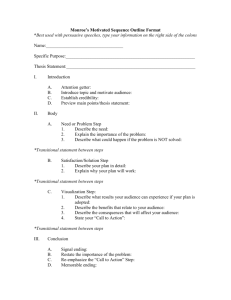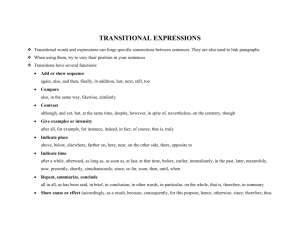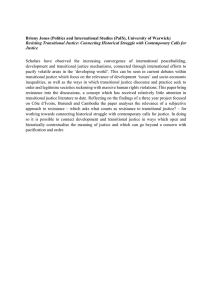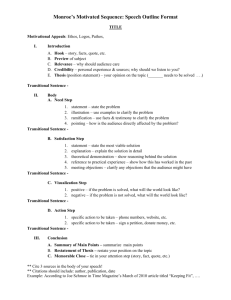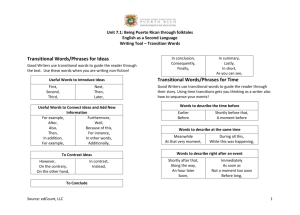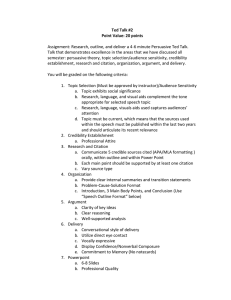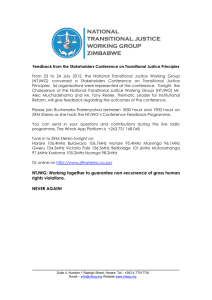Return to Work Policy Gordon State College Purpose
advertisement
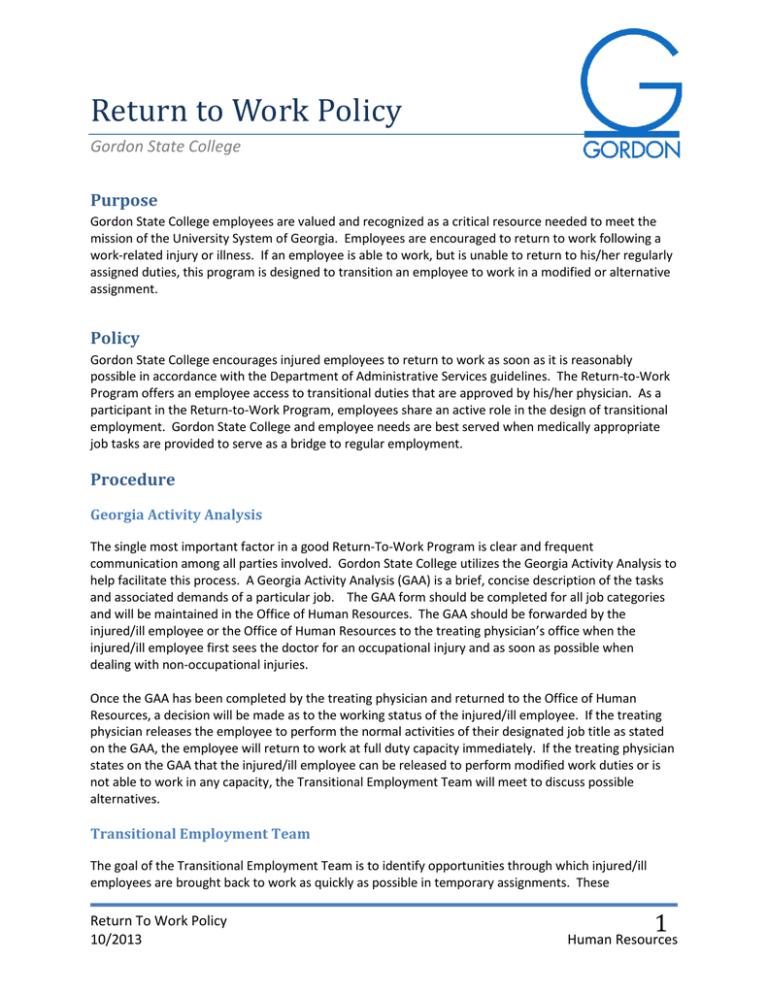
Return to Work Policy Gordon State College Purpose Gordon State College employees are valued and recognized as a critical resource needed to meet the mission of the University System of Georgia. Employees are encouraged to return to work following a work-related injury or illness. If an employee is able to work, but is unable to return to his/her regularly assigned duties, this program is designed to transition an employee to work in a modified or alternative assignment. Policy Gordon State College encourages injured employees to return to work as soon as it is reasonably possible in accordance with the Department of Administrative Services guidelines. The Return-to-Work Program offers an employee access to transitional duties that are approved by his/her physician. As a participant in the Return-to-Work Program, employees share an active role in the design of transitional employment. Gordon State College and employee needs are best served when medically appropriate job tasks are provided to serve as a bridge to regular employment. Procedure Georgia Activity Analysis The single most important factor in a good Return-To-Work Program is clear and frequent communication among all parties involved. Gordon State College utilizes the Georgia Activity Analysis to help facilitate this process. A Georgia Activity Analysis (GAA) is a brief, concise description of the tasks and associated demands of a particular job. The GAA form should be completed for all job categories and will be maintained in the Office of Human Resources. The GAA should be forwarded by the injured/ill employee or the Office of Human Resources to the treating physician’s office when the injured/ill employee first sees the doctor for an occupational injury and as soon as possible when dealing with non-occupational injuries. Once the GAA has been completed by the treating physician and returned to the Office of Human Resources, a decision will be made as to the working status of the injured/ill employee. If the treating physician releases the employee to perform the normal activities of their designated job title as stated on the GAA, the employee will return to work at full duty capacity immediately. If the treating physician states on the GAA that the injured/ill employee can be released to perform modified work duties or is not able to work in any capacity, the Transitional Employment Team will meet to discuss possible alternatives. Transitional Employment Team The goal of the Transitional Employment Team is to identify opportunities through which injured/ill employees are brought back to work as quickly as possible in temporary assignments. These Return To Work Policy 10/2013 1 Human Resources assignments are designed to help the employee remain productive and to speed their medical recovery. Transitional employment is a dynamic process involving input from the employee, his/her supervisor and other involved parties. It is designed to create the best possible return-to-work opportunity for the employee and employer. All information shared with the Transitional Employment Team is discussed on a “need to know” basis only. The team generally needs to know only the employees’ capabilities and must maintain medical confidentiality at all times. The team will consist of the following members: 1. Injured/ill Employee 2. His/Her Manager or Supervisor 3. HR Representative Other members who should be included on an “as needed” basis 1. 2. 3. 4. 5. DOAS Workers Compensation Specialist (Occupational only) Medical Providers Rehabilitation Supplier (Occupational only) Legal Resources Outside Resources (Physical Therapists, Occupational Therapists, etc.) Transitional Employment Plan A transitional employment plan is a temporary job modification that is provided when an employee returns from a work-related injury/illness to medically-restricted or modified duties. Duties assigned can be those identified in the employee’s current job description with restrictions or another assignment at the discretion of management. The Transitional Employment Team will discuss, agree upon and draft a mutually beneficial transitional employment plan. Once the plan has been drafted, a signature is required by the injured/ill employee, the immediate supervisor and the treating physician. The transitional employment plan will have a defined time frame and may be modified at any time based on a change in status or update from the treating physician. An employee who returns to work in a transitional assignment may be assigned to another work site within the college, depending upon the availability of vacant positions or the limitations or abilities of the employee. Other considerations of a transitional employment plan: 1. An employee will not be placed into a transitional or regular position if such an assignment would place the employee or others in danger. 2. An employee will not be placed into a position if such assignment would displace another current employee. 3. An employee in a special transitional assignment is responsible for providing periodic reports from his/her health care provider during the period of the temporary assignment. 4. Transitional employment tasks must be productive and must never be demeaning or appear worthless in any way. 5. It is advisable to keep the injured/ill employee doing as much of his/her regular job as possible Return To Work Policy 10/2013 2 Human Resources and have them continue to work in his/her normal work unit. 6. Any rejection by the injured/ill employee of the transitional employment plan may jeopardize continued temporary income benefits (if applicable.) 7. If the employee rejects the transitional employment plan, then the employee remains off-work until the end of any approved leave period or until the employee is certified by the health care provider to return to full duty. Length of Transitional Employment Transitional duty shall be made available to those employees who are expected to return to their preinjury position and may not normally exceed 90 days. At the conclusion of 90 days, the Transitional Employment Team will meet and discuss the future of the transitional employment plan. If it is determined that the injured/ill employee has permanent restrictions that result in his/her inability to perform the essential functions of his/her primary position, the provisions of the Americans with Disabilities Act (ADA) and other applicable laws will be applied to determine suitability for employment. No Release to Return to Work If transitional employment is not possible for an injured/ill employee with the college or if the employee is not released to work by the treating physician, the Transitional Employment Team will maintain communications with the injured/ill employee and the treating physician in order to obtain the injured/ill employee’s prognosis for recovery and functional capacity. Workers’ Compensation/Return-To-Work Compliance It is a violation of the Return To Work Policy, procedures, and state and federal law to discharge or in any other manner discriminate against an employee because he or she: • • • Files a Workers’ Compensation claim in good faith; Hires a lawyer to represent his or her interests in a Workers’ Compensation claim; and/or Institutes or causes to be instituted in good faith a proceeding with the Georgia State Board of Workers’ Compensation Continued Employment If the employee is unable to return to full duty by the end of the assignment period and/or by the end of the employee’s approved leave period, then the employee’s continued employment with the University shall be considered based upon the business necessity of filling the employee’s position. Nothing in this policy shall be construed as requiring an institution to retain an employee who is not able to return to work following a workplace injury, and such decisions regarding continued employment will be the sole discretion of management with appropriate consideration and attention given to relevant laws. Return To Work Policy 10/2013 3 Human Resources

